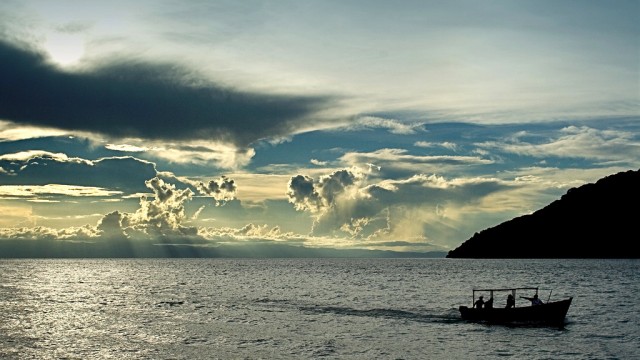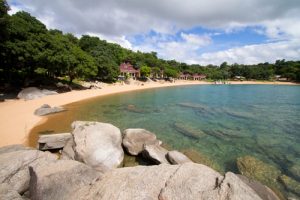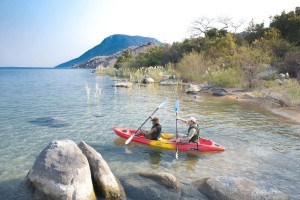Serene and strangely hypnotic, Lake Malawi seems to define the country that provides its name.
Mozambique and Tanzania also lay a claim to the long strip of water that merges Southern and Eastern Africa. Yet on the world map it’s called Lake Malawi, something the country stoically defends and promotes. It’s not just a question of national pride. Malawi has always struggled in the competition for tourists. In a continent of superlatives the country can’t boast about big five safari, mountain ranges, or endless coastline. But it has this, a soporific expanse of water that extends beyond the horizon, welcoming me to the country with unassuming grace.
Spreading the Wealth: Cape Maclear on the Southern Shore
I start in Cape Maclear, a lazy and languid village on the lake’s southern end, the water singing a never-ending lullaby as it shimmers beneath the palms. Wooden shacks are flanked by tropical vegetation, barefooted locals drink plastic sachets of cane spirit, and bamboo stalls add a whiff of rotting fish to the air. A flurry of shouts guides me two streets back from the lake. Children are cheering as furniture is carefully removed from a house, while old men gesticulate as they value plates and cutlery. I start asking questions, opening my ears to a tale of public justice. A corrupt policeman has been borrowing money, drinking away the Malawian Kwacha and racking up debts to several people across the village. Now the locals have joined forces, ransacking his home and dividing the belongings between the victims. “Aren’t you scared that his policeman friends will come?” I ask. “No!” comes an unanimous reply. “We will deliver him to the police chief so he can never come back.”
It’s not the only novel method of spreading wealth here. Endemic to many villages along Lake Malawi are wannabe tour guides, curio makers, and drug dealers; groups of young males encompassing all three professions. But insistent pushers violate tranquility. In Cape Maclear, four locals are given a monopoly to provide services to guests at a particular lodge. Seven days later they switch with another mob, with anyone breaking the rules getting a two month ban. I opt for renting a sea kayak, paddling along the banks and being enchanted by the soft shouts of fishmongers and fruit sellers, frolicking children and nattering women.
Maths and Malawians: Senga Bay in the South West
As the road winds north the lake always feels within reach, even when it disappears behind a mountain ridge or half decimated forest. It’s a soothing sight, helping to numb the discomfort as buses sometimes refuse to leave until all standing room is taken. Fuel shortages continue to blight the country, a hangover that’s blamed on the late President Bingu wa Mutharika. Locals joke that his private mausoleum had to be cleared of dollars before he could be buried. Up, down, around, and then the lake returns, a glistening expanse of blue welcoming me to Senga Bay.
There’s more development here, a couple of three story concrete hotels with balconies overlooking the Lake Malawi sunrise. Malawians are also on vacation here, people from capital city Lilongwe tentatively dipping their toes in the warm water. They’re not sunbathing though, long lazy hours are spent playing Malawi bao, the national board game that can be seen everywhere; in markets, on beaches, at bus stops, beneath shady trees, and all along Lake Malawi. Crowds gather around tables, vociferously cheering on the underdog as eager contestants play winner stays on.
The Backpacker Hangout of Nkhata Bay
Nkhata Bay is perched along green hilltops, the lodges nestled amongst rugged forest. The only flat land is dominated by a bustling market, one that’s filled with excited chatter as I arrive. A scared looking man is stripping to his underwear. “He was stealing” somebody explains, “the expensive batteries.” Someone carefully pours a tin of paint over his head, turning the thief into a sticky mess of gloss white. This wreckage of discredited paint receives a volley of kicks to the backside as he walks off alone. I feel stupid asking, but why? “Everyone will see the paint and know he is a thief!”
Nkhata Bay is the country’s backpacker hotspot, combining serenity with enough foreigners to start a party. Dug out canoes gently traverse the water, fried cassava smells flicker through the streets, and it’s easy to laze away a few days on a pebbled beach. The availability of simple Western pleasures make it magnet for many on a long journey between Southern and Eastern Africa. That makes it expensive by Malawian standards, although simple wooden huts with an uninterrupted lake view still cost less than $15pp. Like most visitors I wake feeling determined to leave. But by midday I’m settled into the gentle rhythm and resigned to another night.
Popular Overland Stops on The Idyllic North West Shoreline
As I travel further north the villages become more sporadic. Rutted trails lead to pristine beaches, places of great excitement when the large overland tour groups roll in once a week. Hammocks and overpriced bars stand isolated in the sand, essentially limiting a truckload of visitors to a couple of tiny establishments on the beach. Places like Chitimba are undeniably beautiful, the soothing water subtly changing color as the sun rises and falls. Yet they lack the local interaction, leaving me with little more than a secluded piece of quasi paradise. It’s more than enough for an escape. But that isn’t what Lake Malawi is about.
The Blurring of Local Life and Tourist Experience
Perched above the lake is Livingstonia, a village of mud huts, limited electricity, and a huge Victorian church. The imposing stone was brought by ship and canal in the early 20th century, dominating a village where everyone walks barefoot. “Of course we are proud” says a baker, “no other village has a building made from the best Scottish stone!” I’m sure I would feel resentment if it was my village, and as I’m lost in thought an emaciated woman shouts for my attention. She runs after me, waves a 1000 kwacha note (approx. $2.50), then stuffs it into my hand on the empty street. It had fallen from my pocket.
Her actions epitomize this genial shoreline. The charm of Lake Malawi lies in the blurring of any distinction between tourist experience and local life. Stopping for conversation is as integral as enjoying the water. It feels essential to remove my watch and accept the lethargic interpretation of time. An immersion with village traditions is parts of the Lake Malawi experience. Because while Malawi can’t offer safari or boastful superlatives, it delivers a compelling dose of honesty and simple pleasures.




